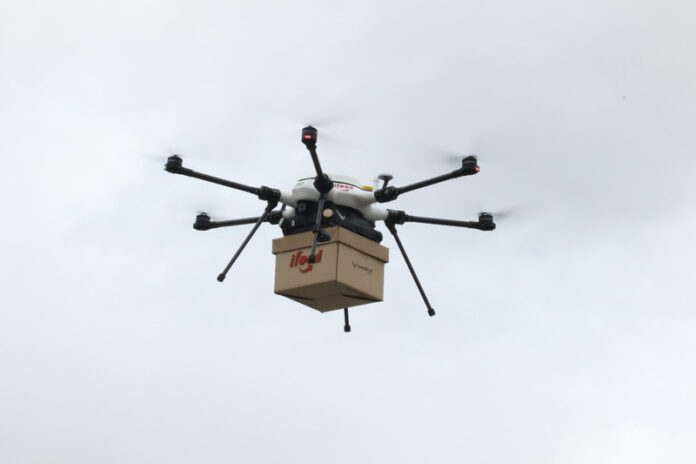O iFood anuncia a retomada e a expansão da operação de entregas por drones em Sergipe, em parceria com a Speedbird Aero, marcando uma nova fase do projeto e consolidando o avanço do seu modelo de entregas multimodal. A rota, pioneira no Brasil e na América Latina para delivery, será ampliada após a Agência Nacional de Aviação Civil (ANAC) conceder a primeira autorização permanente do país para voos seguros sobre áreas com circulação de pessoas. Além disso, entra em operação uma nova aeronave capaz de transportar até 5 quilos – antes, o limite era de 3 quilos.
A rota parte do Shopping Center RioMar, em Aracaju, sobrevoa um trecho de menos de um minuto em área com circulação de pedestres e cruza o rio Sergipe para chegar a Barra dos Coqueiros, conectando restaurantes de um município a condomínios residenciais da cidade vizinha. Pelo ar, o percurso tem menos de quatro quilômetros, e a entrega chega ao consumidor em até 30 minutos. O entregador é o responsável pela última milha, ou seja, o trecho que vai do pouso do drone até o consumidor.
Por terra, o trajeto demoraria cerca de uma hora, já que ida e volta somam 36 quilômetros e atravessam áreas de trânsito intenso. Esse percurso inviabilizaria a operação apenas com entregadores, que ficariam restritos a poucas entregas nos horários de almoço e jantar, que são os picos de demanda.
“O iFood é multimodal: combina bicicletas, motos, carros, barcos, robôs e agora também drones para conectar um ecossistema complexo de entregas com precisão. O drone entra para resolver trechos que não fariam sentido para o entregador, que continua sendo alocado em rotas mais produtivas”, Rodolfo Klautau, diretor de Logística do iFood.
O serviço funcionará sete dias por semana, durante 10 horas por dia. A rota, iniciada em 2021 como projeto-piloto, foi a primeira a obter autorização permanente para transporte de alimentos por drones na América do Sul. Agora, em nova fase, a operação retorna com capacidade para até 280 pedidos por dia.
A retomada da operação em Aracaju reforça a estratégia do iFood de investir em um modelo de entregas multimodal, que combina diferentes meios de transporte para superar os desafios geográficos e urbanos do Brasil. Os drones são especialmente relevantes em trajetos que envolvem barreiras naturais, como rios ou áreas de difícil acesso, além de regiões distantes. Nesses casos, a tecnologia aérea encurta caminhos, reduz o tempo de entrega e amplia o alcance dos restaurantes.
“A retomada e expansão do projeto em Aracaju é um marco não apenas para o iFood e a Speedbird, mas para todo o setor de mobilidade aérea no Brasil. Trata-se da primeira autorização permanente da ANAC para voos sobre áreas com circulação de pessoas, um passo fundamental para a consolidação das entregas por drone no país. Estamos muito orgulhosos de liderar esse avanço com uma aeronave nacional de maior capacidade, que torna a operação mais eficiente e robusta. Essa conquista demonstra que a inovação feita no Brasil tem maturidade para transformar realidades urbanas, encurtando distâncias e criando soluções logísticas sustentáveis”, afirma Manoel Coelho, CEO da Speedbird Aero.
A Speedbird Aero é, até hoje, a única empresa com dois modelos de drones aprovados pela ANAC para operações BVLOS (‘além da linha de visada do operador’, em português) voltadas à entrega de cargas no Brasil. Essas certificações representam marcos inéditos e trazem diferenciais importantes, como a permissão para voar à noite. Cada processo de autorização levou, em média, de 12 a 24 meses e seguiu rigorosamente todas as normas de segurança, com aprovação da ANAC e do DECEA.
“O iFood acredita que inovar é também construir junto com quem já está fazendo. A Speedbird é uma empresa brasileira que, assim como nós, aposta em tecnologia nacional de ponta para resolver desafios reais. Esse projeto mostra como a inovação feita no país pode aproximar o próprio Brasil de si mesmo, conectando cidades e encurtando distâncias que antes pareciam impossíveis”, afirma Klautau.
Como funciona o drone do iFood?
- Capacidade: até 5 kg (nesta retomada, apenas pedidos de comida).
- Velocidade: 50 km/h.
- Altitude: até 60 metros (equivalente a um prédio de 20 andares).
- Segurança: equipado com GPS para navegação e paraquedas em caso de emergência.
- Operação: comandado por um centro de controle da Speedbird Aero em Franca (SP).
- Frota: dois drones disponíveis para o trajeto, que podem ser acionados ao mesmo tempo, conforme a demanda.
- Resistência: suporta ventos de até 55 km/h e chuva leve (5 mm por hora).



